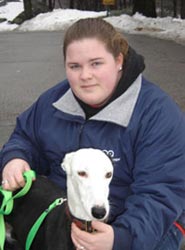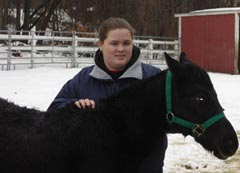Alyssa Kane
 She's a long-time animal shelter volunteer, a foster caregiver to homeless pets, and spends her Friday evenings and summers teaching children to be responsible pet guardians. That's why lifelong animal lover Alyssa Kane of Dedham, Massachusetts was recently selected as the 2008 Humane Teen of the Year by The Humane Society of the United States (HSUS).
She's a long-time animal shelter volunteer, a foster caregiver to homeless pets, and spends her Friday evenings and summers teaching children to be responsible pet guardians. That's why lifelong animal lover Alyssa Kane of Dedham, Massachusetts was recently selected as the 2008 Humane Teen of the Year by The Humane Society of the United States (HSUS).
IML talked to Alyssa about her work with animals and how young people can really make a difference in the lives of their furry friends!
IML: How did you first get involved with helping animals? How old were you and what was it that motivated you to get involved to begin with?
Alyssa: I have always been drawn to animals, but it wasn't until I was 13 that I began volunteering at the Animal Rescue League of Boston's Mutts N More (a volunteer group for 13-16 year olds that meets once a week). The staff at the shelter was extremely inviting and taught me everything they could about all the animals that come through the shelter. Soon I was at the shelter a couple of times a week.
IML: You have a lot of different roles at the ARL. What's the most rewarding? What's the most difficult?
Alyssa: At the shelter I help out with whatever needs to be done. If the staff members need help cleaning cages, giving medicines to animals, or assisting in adoptions or animal surrenders, I jump in and help them. The most rewarding role at the ARL is seeing the animals that you worked hard caring for get adopted into their new home. The most difficult role at the ARL is when animals are euthanized; it never becomes easy to deal with.
 IML: How has working with animals helped you in other areas of your life?
IML: How has working with animals helped you in other areas of your life?
Alyssa: Working with animals has definitely been a stress reliever for me. Animals are always there for you when you've had a bad day or don't feel well; they only want your attention and never disappoint you. Not only have I met animals that have become "friends" of mine but I have also become friends with the staff. The staff and volunteers have become one big family because we enjoy working together and helping animals.
IML: You spend some of your time educating children about animals and their needs. What do you see is one of the biggest misconceptions that young people have about animals?
Alyssa: The children I talk to don't usually understand the pet overpopulation problem in the United States. They talk about how their animals have had babies and how they gave them to the shelter, but that is the problem; the shelters are having trouble finding room to put these animals in their shelters, never mind finding homes for the animals they already have. That is why I love talking to the children. The staff and I preach about the importance of spaying and neutering to control the homeless animal population.
IML: What's your advice for someone who's interested in getting a new pet and isn't sure whether or not they should adopt from a shelter/rescue group?
Alyssa: When looking for a new pet whether it is a dog, cat, horse, hamster, gerbil, rabbit, or any other animal, you can usually find many waiting for homes at shelters. I encourage people to check with their local shelter because they can probably find the animal they are looking for right around the corner!
IML: What do you think is the most important thing for someone to consider when trying to decide if a pet is right for them and their family?
Alyssa: The most important thing to consider when searching for the animal that fits perfectly into your life is time. How much time can you devote to this animal? If you aren't home for most of the day then don't get a dog, maybe think about a cat or small animal. If you are home all the time a dog might be a great addition to your family.
IML: What's your advice for younger kids who want to help animals but don't know how to start? For instance, if they're only 8 or 9 and are too young to volunteer at a shelter, what else could they do to make a difference in their community?
Alyssa: A great way for young people to help animals in their community is to start a club focused on animals or animal protection. They could also hold a fundraiser to raise money or supplies (such as blankets, towels, toys, and food) for their local animal shelter. At the Humane Teen website (www.humaneteen.org) younger kids can talk with older kids about their experiences with animals and how to help in their community. There is also a program for kids at Humane Teen called Mission: Humane which helps kids help animals through special projects!
IML: Surely you've seen some really heartbreaking stories. Can you tell us one of your favorite success stories?
Alyssa: My favorite success story is about a sheep named Julio. A bunch of sheep were brought to our shelter because their former owner had been neglecting them and Julio's pregnant mother was one of them. Julio was born shortly after his mother's arrival at the ARL and I began socializing him when he was a couple of days old. Julio had to remain at the ARL for about 3 years because the former owner was being charged with animal cruelty and it took many years to complete the court process. As soon as the sheep were put up for adoption, Julio was adopted. Out of over 50 sheep he stood out, and that is probably because he was very friendly and came when his name was called. The socialization the staff and I gave him molded him into a very outgoing and loving animal!
IML: Thanks for talking to us, Alyssa. Keep up the amazing work on behalf of the animals!
Alyssa Thanks! I will!
Read more about young celebrities in Celebs Say....
 E-mail this page to a friend
E-mail this page to a friend



